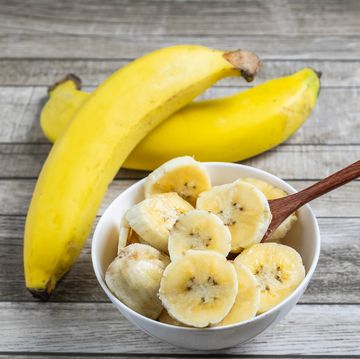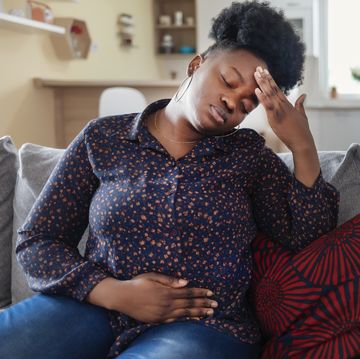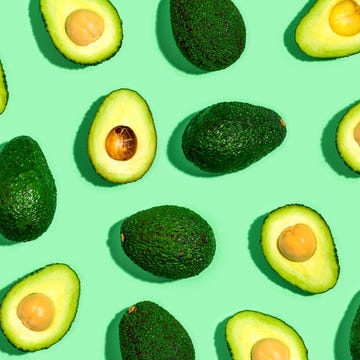How To Get Rid Of A Stomach Ache: 15 Long And Short-Term Solutions, According To Experts
Ginger tea > ginger ale.

Women's Health may earn commission from the links on this page, but we only feature products we believe in. Why Trust Us?
Picture this: You're going about your day when all of a sudden you feel a not-so-subtle stomach ache starting to kick in. Unfortunately, stomach pain can stem from a lot of different things. Maybe you ate some not-so-great food, ate too fast, or ate something that triggered an intolerance that you have. And then, of course, there are more serious conditions that can bring one on as well (but more on that in a moment).
Symptoms like bloating, diarrhea, and nausea can make everyday functions feel impossible, and you might be asking yourself ‘What gives?’ Basically, stomach aches can occur whenever there is irritation of the stomach lining, says Henry Herrera, MD, a gastroenterologist at DHR Health Gastroenterology in Edinburg, Texas.
Fortunately, the vast majority of stomach aches go away on their own. Still, it’s important to keep tabs on how often your stomach aches occur and what they feel like in case it’s a sign of an underlying issue that requires a trip to your doctor. “Other factors must be considered, such as the character of the pain, intensity, and location along with associated symptoms,” says Leila Kia, MD, a gastroenterologist at Northwestern Medicine.
Ahead, read up on some of the most common causes of stomach aches plus 15 expert-approved tips on how to get rid of them fast.
Meet the experts: Henry Herrera, MD, is a gastroenterologist at DHR Health Gastroenterology in Edunburg, Texas. Leila Kia, MD, is a gastroenterologist at Northwestern Medicine in Chicago. Amit Bhan, MD, is a gastroenterologist at Henry Ford Hospital in Detroit. Georgia Close, MD, is a New York-based board-certified gastroenterologist and a scientific advisor for Hilma. Samantha Nazareth, MD, is a New York-based board-certified gastroenterologist and Women’s Health advisory board member. Michael Wolfe, MD, is the chair of the Case Western Reserve University department of medicine at MetroHealth Medical Center in Cleveland, Ohio. Jeffry A. Katz, MD, is a gastroenterologist at University Hospitals Cleveland Medical Center. Minh Nguyen, MD, is a gastroenterologist at Fox Chase Cancer Center in Philadelphia. Charlene Prather, MD, is an associate professor of gastroenterology at Saint Louis University School of Medicine. Irwin Grosman, MD, is the associate chief of gastroenterology at NYP Brooklyn Methodist Hospital in Brooklyn. Rita Knotts, MD, is a gastroenterologist and assistant professor of medicine at NYU Langone Health in New York.
What are some of the most common causes of stomach aches?
The list of reasons as to why someone may be experiencing a stomach ache is a lengthy one. But here are some of the most common causes and how they differ, according to experts.
Food poisoning: Unlike minor stomach aches, symptoms of food poisoning tend to last longer (about 24 to 72 hours). In mild cases, someone may experience bloating and discomfort. In more severe cases, it can lead to diarrhea, nausea, vomiting, fever, or chills.
Appendicitis: The pain caused by appendicitis comes on suddenly and can feel intense. “It starts on the right side, on the lower part of your stomach,” says Samantha Nazareth, MD, a board-certified gastroenterologist and Women’s Health advisory board member. “The pain can move to the belly button or shift in that area, but it can also include nausea, vomiting, or fever.” You'll want to get medical attention stat if you believe you have appendicitis.
Eating too quickly: If you eat too fast, there’s a chance you’ll swallow more air than you should—this is called aerophagia. “Swallowing too much air can cause bloating, gas, burping, and belching,” says Georgia Close, MD, a board-certified gastroenterologist and a scientific advisor for Hilma.
Ovarian cysts: This is likely to be felt in the lower part of the stomach and can be very painful. In this case, going to the hospital for imaging (like an ultrasound or CAT Scan) can help determine the next steps.
A bowel obstruction: Peritonitis leads to intense pain because the bowels have ruptured. Dr. Nazareth adds that this can be life-threatening and needs to be treated quickly.
Heartburn or acid reflux: Unlike other possibilities, many people describe this as a burning sensation and less of an ache, says Dr. Nazareth. This is super common, with Dr. Close adding that about one in five adults experience either issue.
Irritable Bowel Syndrome (IBS): “IBS/functional bowel disorders affects up to 25% of the US population (including both diarrhea and constipation subtypes),” says Dr. Close. They’re very common and lead to aches in the lower belly. However, it’s important to note that not all constipation is IBS.
Lactose Intolerance: This stems from a person's inability to process the sugar in milk, which results in diarrhea, gas, or bloating, per Mayo Clinic. “Sixty-five percent of the global population has some sort of inability to digest lactose,” says Dr. Close.
When should you see a doctor about stomach pain?
With all the possible causes of a stomach ache, it can be difficult to determine what warrants a trip to the doctor. “There are certain things that we call ‘alarm symptoms’,” says Dr. Close. “Symptoms like difficulty swallowing, feeling like food is getting stuck, nausea, vomiting, feeling full easily, unintentional weight loss, and blood in the stool (including bright red blood or black stools) absolutely calls for an evaluation.” Dr. Nazareth notes that severe culprits of stomach aches typically include pain that comes on suddenly rather than a slow buildup. If the pain is keeping or waking you up at night, is accompanied by a fever, or does not subside with OTC meds, you should also make an appointment to see a doc ASAP.
On the other hand, if you have a run-of-the-mill stomach ache, or want to prevent them in the future, consider one of these potential remedies:
Sabrina is an editorial assistant for Women’s Health. When she’s not writing, you can find her running, training in mixed martial arts, or reading.
Georgia Close, MD, is a New York-based board-certified gastroenterologist and a scientific advisor for Hilma.

What To Eat And What To Avoid If You Have Diarrhea

13 Reasons Your Stomach Hurts After Eating A Meal

Is It Safe To Take Probiotics Every Day?

How To Reduce Bloating And Get Instant Relief























